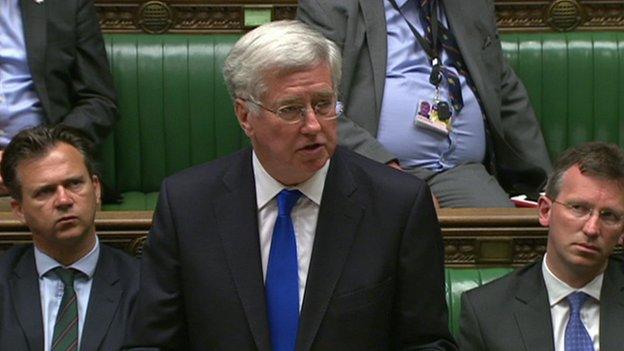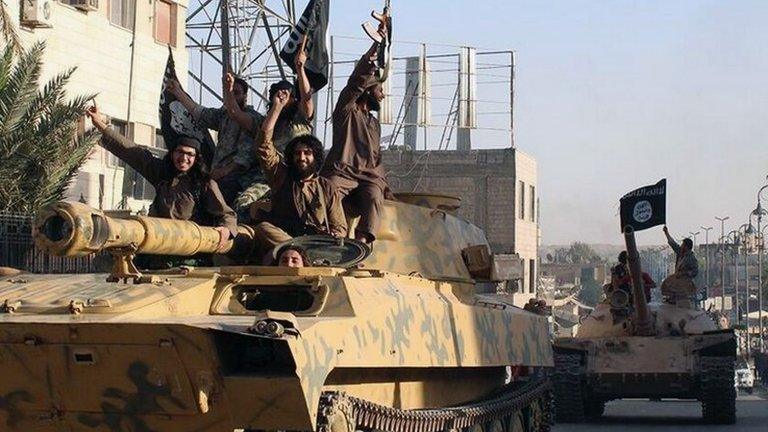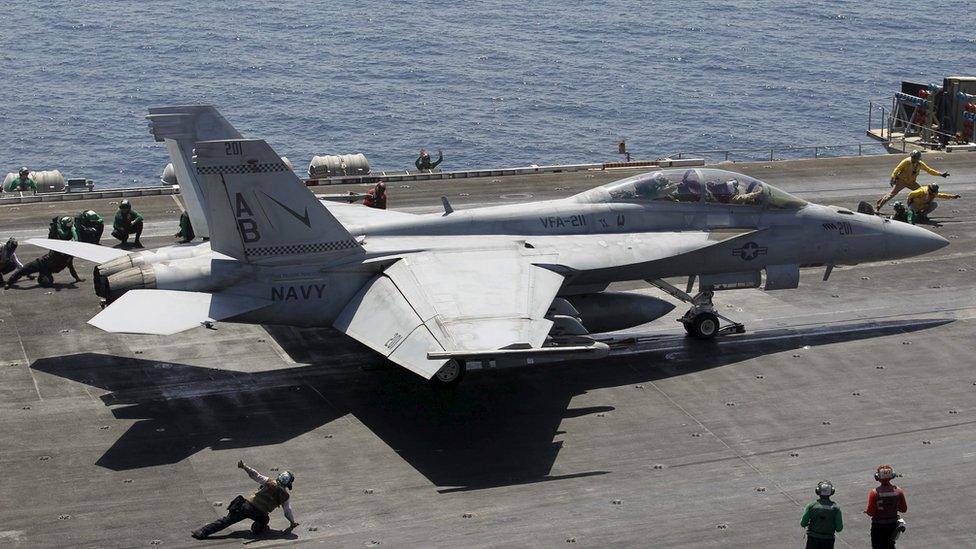Fallon denies MPs 'kept in dark' about UK role in Syrian air strikes
- Published

Defence Secretary Michael Fallon has rejected claims MPs have been "kept in the dark" about the involvement of British pilots in airstrikes in Syria.
He told MPs it was "standard practice" for UK personnel to be embedded with allied forces and their engagement was not a "British military operation".
MPs backed UK airstrikes against Islamic State fighters in Iraq last year but not in Syria.
Labour said lack of openness undermined public confidence in the fight.
MPs voted against proposed military action against the Assad government in Syria two years ago.
The involvement of UK pilots in action over Syria, acting in co-operation with the US, Canada and other coalition nations' forces, emerged via a Freedom of Information request last week.
'Nothing new'
In a statement to Parliament, Mr Fallon confirmed five British pilots have conducted air strikes against Islamic State militants in Syria after being embedded with allied forces while 75, in total, had been involved in wider allied military operations in Syria.
He said their involvement had been approved by ministers in advance and was part of the UK's "significant contribution" to the fight against IS. The UK, he added, was conducting 30% of unmanned aerial surveillance and intelligence reconnaissance over Syria.
Mr Fallon said that, for security purposes, it was the UK's policy not to publicise the participation of embedded UK forces in military operations but if asked to give details "of course we give details".
"There is nothing new about embeds," he told MPs. "This has been going on for 40 or 50 years."
The defence secretary rejected claims that the government has deliberately tried to keep the information secret, saying that it had been "open and transparent" in response to the FOI request by campaign group Reprieve.
"This did not drag information out of us," he said. "A question was put to us and we answered it.... we put this information on the Ministry of Defence website."
British troops, he said, had to abide by the same "rules of engagement" as if they were involved in British operations, upholding British as well as international law and their missions had been approved by allied governments.
He added: "This is not a British military operation. If it was, of course we would have come to Parliament for preliminary approval."
'Mission creep'
Islamic State militants were planning and instigating attacks from inside Syria and posed a "direct threat" to the UK, he said.
Amid reports that the government may ask MPs to vote on direct UK airstrikes in Syria this autumn, he said there would be a time for MPs to reconsider whether Islamic State should be confronted "at source" although he again ruled out any forces on the ground.
Shadow defence secretary Vernon Coaker said the government had "no intention" of telling Parliament about the UK's involvement and that the lack of transparency and accountability damaged trust in the fight against extremism.
"Can you not see that your authorisation could have resulted in a British pilot being captured, tortured or indeed killed by Isil? And can you not see how such an event would have undermined public confidence in our entire strategy to combat Isil?
Labour MP Michael Meacher urged Mr Fallon to apologise and consider his position, saying the UK's strategy risked turning into "mission creep without a mandate".
Mr Fallon also came under pressure from Conservative MPs, Sir Edward Leigh telling him "not to take us for granted" and to tell MPs "what is going on". And Julian Lewis said it highlighted the fact the UK had "no coherent strategy" towards Syria.
Speaking on Sunday, David Cameron said Britain was committed to working with the US to destroy the "caliphate" set up by Islamic State militants in Iraq and Syria.
The prime minister told US TV network NBC he wanted the UK to do more but said he needed to "take Parliament with him".
Lord Richards, former chief of defence staff, called for a new strategy to defeat IS, saying he suspected ground troops would be deployed in the future.
- Published19 July 2015

- Published17 July 2015
